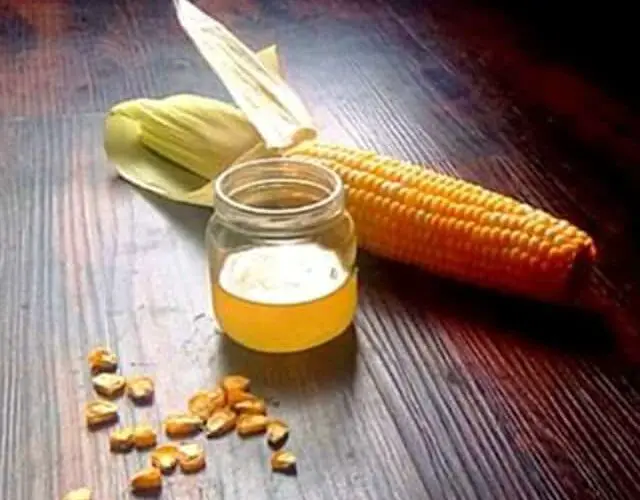Corn syrup is a sweetener made from corn starch. It is a viscous, syrupy liquid that is commonly used as a sweetening ingredient in various food and beverage products.
To produce corn syrup, cornstarch is treated with enzymes that break down the starch into simpler sugars, mainly glucose. This enzymatic process is known as hydrolysis. The resulting syrup is thick and sweet, with a high concentration of glucose.
Corn syrup is widely used in the food industry due to its functional properties. It helps improve texture, enhances moisture retention, and prevents crystallization in certain products. It is commonly found in baked goods, soft drinks, candies, sauces, and processed foods.
There are different types of corn syrup available, with varying levels of sweetness and viscosity. Light corn syrup is clear and mildly sweet, while dark corn syrup has a deeper color and a stronger flavor reminiscent of caramel. High-fructose corn syrup (HFCS) is another variation where some of the glucose in corn syrup is converted to fructose. HFCS is commonly used in soft drinks and other sweetened beverages.
Ingredients:
- 2 cups granulated sugar
- 3/4 cup water
- 1/4 teaspoon cream of tartar
- 1/4 teaspoon lemon juice
Instructions:
- In a medium-sized saucepan, combine the granulated sugar, water, cream of tartar, and lemon juice. Stir well to dissolve the sugar.
- Place the saucepan over medium heat and bring the mixture to a boil. Stir occasionally to ensure the sugar is completely dissolved.
- Once the mixture reaches a boil, reduce the heat to low and let it simmer for about 15-20 minutes. During this time, do not stir the mixture.
- After simmering, check the consistency of the syrup. You want it to thicken slightly but still be pourable. If it seems too thick, you can add a little more water and simmer for an additional 2-3 minutes.
- Remove the saucepan from the heat and let the syrup cool completely. As it cools, it will thicken further.
- Once the syrup has cooled, transfer it to a clean, airtight container. It can be stored at room temperature for several weeks.
Is corn syrup bad for you?
- High Sugar Content: like other sweeteners, is high in sugar. Consuming excessive amounts of added sugars can contribute to weight gain, obesity, and related health issues. It is essential to moderate your overall sugar intake, including corn syrup.
- Added Sugars and Health Risks: Diets high in added sugars have been linked to an increased risk of chronic conditions such as type 2 diabetes, heart disease, and dental problems. These risks are not specific to corn syrup alone but apply to excessive sugar consumption in general.
- Nutritional Value: it provides calories from sugar but lacks significant nutritional value. It does not offer essential vitamins, minerals, or other beneficial nutrients. Relying heavily on foods and beverages high in corn syrup can lead to a less balanced diet.
- Fructose Content: Some types of this, such as high-fructose corn syrup (HFCS), contain a higher proportion of fructose. Studies suggest that excessive consumption of fructose, especially in the form of HFCS, may have adverse effects on metabolic health and contribute to insulin resistance and fatty liver disease. However, it’s important to note that the fructose content in most types of corn syrup is relatively low compared to HFCS.
Notes
- It is primarily used as a sweetening ingredient in various food and beverage products. It is a viscous, syrupy liquid with a high concentration of glucose.
- It is made by treating corn starch with enzymes through a process called hydrolysis. This process breaks down the starch into simpler sugars, primarily glucose.
- It is widely used in the food industry due to its functional properties. It helps improve texture, enhances moisture retention, and prevents crystallization in certain products.
- It has been a subject of debate due to its association with added sugars and potential health concerns. Excessive consumption of added sugars, including corn syrup, has been linked to health issues such as obesity, diabetes, and dental problems. Moderation and a balanced diet are recommended.
FAQs
- Is corn syrup gluten-free?
Yes, it is generally considered gluten-free as it is derived from corn starch, which does not contain gluten. However, it’s always a good idea to check the label or contact the manufacturer to ensure it is specifically labeled as gluten-free.
- Is corn syrup natural?
this syrup itself is derived from corn starch, which is a natural ingredient. However, the production process involves enzymatic hydrolysis, which is a chemical process. Some commercial corn syrups may also undergo additional refining and processing steps.
- Can corn syrup be used in baking?
Yes, it is commonly used in baking to provide sweetness, moisture retention, and prevent crystallization. It is often used in recipes for candies, caramel sauces, pies, and certain baked goods.
- Is corn syrup unhealthy?
Excessive consumption of added sugars, including, has been associated with health risks such as obesity, diabetes, and dental problems. It is important to moderate your overall sugar intake and maintain a balanced diet that includes a variety of nutrient-rich foods.
Nutrition
- Calories: 60-65 calories
- Total Carbohydrates: 17 grams
- Total Sugars: 17 grams
- Fat: 0 grams
- Protein: 0 grams
- Fiber: 0 grams
- Sodium: 0-5 milligrams
corn syrup (homemade corn syrup)
Corn syrup is a sweetener made from corn starch. It is a viscous, syrupy liquid that is commonly used as a sweetening ingredient in various food and beverage products.
To produce corn syrup, cornstarch is treated with enzymes that break down the starch into simpler sugars, mainly glucose
Ingredients
- 2 cups granulated sugar
- 3/4 cup water
- 1/4 teaspoon cream of tartar
- 1/4 teaspoon lemon juice
Instructions
- In a medium-sized saucepan, combine the granulated sugar, water, cream of tartar, and lemon juice. Stir well to dissolve the sugar.
- Place the saucepan over medium heat and bring the mixture to a boil. Stir occasionally to ensure the sugar is completely dissolved.
- Once the mixture reaches a boil, reduce the heat to low and let it simmer for about 15-20 minutes. During this time, do not stir the mixture.
- After simmering, check the consistency of the syrup. You want it to thicken slightly but still be pourable. If it seems too thick, you can add a little more water and simmer for an additional 2-3 minutes.
- Remove the saucepan from the heat and let the syrup cool completely. As it cools, it will thicken further.
- Once the syrup has cooled, transfer it to a clean, airtight container. It can be stored at room temperature for several weeks.
Notes
- Corn syrup is primarily used as a sweetening ingredient in various food and beverage products. It is a viscous, syrupy liquid with a high concentration of glucose.
- Corn syrup is made by treating corn starch with enzymes through a process called hydrolysis. This process breaks down the starch into simpler sugars, primarily glucose.
Also, read:
- Chicken Momos Recipe (step by step)
- Paneer do pyaza recipe
- how to make paneer butter masala
- Palak Paneer Recipe
- Paneer Dum Biryani Recipe



